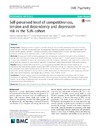Identificador persistente para citar o vincular este elemento:
https://accedacris.ulpgc.es/jspui/handle/10553/42087
| Campo DC | Valor | idioma |
|---|---|---|
| dc.contributor.author | Lahortiga-Ramos, Francisca | en_US |
| dc.contributor.author | Raquel Unzueta, Cristian | en_US |
| dc.contributor.author | Zazpe, Itziar | en_US |
| dc.contributor.author | Santiago, Susana | en_US |
| dc.contributor.author | Molero, Patricio | en_US |
| dc.contributor.author | Sánchez-Villegas, Almudena | en_US |
| dc.contributor.author | Martínez-González, Miguel Ángel | en_US |
| dc.date.accessioned | 2018-10-05T08:09:47Z | - |
| dc.date.available | 2018-10-05T08:09:47Z | - |
| dc.date.issued | 2018 | en_US |
| dc.identifier.issn | 1471-244X | en_US |
| dc.identifier.uri | https://accedacris.ulpgc.es/handle/10553/42087 | - |
| dc.description.abstract | Background: Emerging evidence suggests a possible etiologic role of certain personality traits (not necessary dysfunctional) in the risk of depression, but the longitudinal long-term available evidence is currently scarce. We longitudinally assessed whether 3 common personality traits (competitiveness, tension and dependency) were associated with the risk of depression after a maximum follow-up of 15 years. Methods: We assessed 15,604 university graduates free of depression at baseline through a self-administered questionnaire including personality traits. Simple, Likert-type, questions with 11 possible answers ranging from 0 to 10 were used at baseline to assess the 3 personality traits. We compared participants with high scores (7–10) versus those with low scores (0–4). New medical diagnoses of depression during follow-up were used as the outcome. Results: During a median follow-up of 10.1 y, we prospectively identified 902 new medical diagnoses of depression. The multivariable-adjusted hazard ratios (95% confidence intervals) for depression were 1.85 (1.52 –2.24) for participants with higher baseline tension (7–10 versus 0 to 4), P-trend < 0.001; and 1.23 (1.06–1.44) for high versus low baseline dependence levels, P-trend = 0.004. Higher levels of competitiveness were marginally associated with lower risk of depression, with hazard ratio = 0.78 (0.61–1.01), P-trend = 0.105. Conclusion: A simple scoring system of personality traits shows an independent association with the future occurrence of depression. This finding underscores, with now prospective evidence, the importance of personality traits in the aetiology of depression and can provide a clinically useful tool for gathering valid information about depression-related personality traits. | en_US |
| dc.language | eng | en_US |
| dc.publisher | 1471-244X | |
| dc.relation.ispartof | BMC Psychiatry | en_US |
| dc.source | BMC Psychiatry [ISSN 1471-244X], v. 18, article number 241 | en_US |
| dc.subject | 32 Ciencias médicas | en_US |
| dc.subject.other | Depression risk | en_US |
| dc.subject.other | Competitiveness | en_US |
| dc.subject.other | Tension | en_US |
| dc.subject.other | Dependency | en_US |
| dc.title | Self-perceived level of competitiveness, tension and dependency and depression risk in the SUN cohort | en_US |
| dc.type | info:eu-repo/semantics/Article | es |
| dc.type | Article | es |
| dc.identifier.doi | 10.1186/s12888-018-1804-x | |
| dc.identifier.scopus | 85050693509 | |
| dc.identifier.isi | 000440203400004 | - |
| dc.contributor.authorscopusid | 8573786900 | |
| dc.contributor.authorscopusid | 57201338188 | |
| dc.contributor.authorscopusid | 24385723800 | |
| dc.contributor.authorscopusid | 36626331900 | |
| dc.contributor.authorscopusid | 23973669400 | |
| dc.contributor.authorscopusid | 6602876903 | |
| dc.contributor.authorscopusid | 7004290629 | |
| dc.relation.volume | 18 | - |
| dc.investigacion | Ciencias de la Salud | en_US |
| dc.type2 | Artículo | en_US |
| dc.contributor.daisngid | 6499560 | |
| dc.contributor.daisngid | 13467003 | |
| dc.contributor.daisngid | 630646 | |
| dc.contributor.daisngid | 500385 | |
| dc.contributor.daisngid | 1445373 | |
| dc.contributor.daisngid | 289030 | |
| dc.contributor.daisngid | 17754 | |
| dc.contributor.wosstandard | WOS:Lahortiga-Ramos, F | |
| dc.contributor.wosstandard | WOS:Unzueta, CR | |
| dc.contributor.wosstandard | WOS:Zazpe, I | |
| dc.contributor.wosstandard | WOS:Santiago, S | |
| dc.contributor.wosstandard | WOS:Molero, P | |
| dc.contributor.wosstandard | WOS:Sanchez-Villegas, A | |
| dc.contributor.wosstandard | WOS:Martinez-Gonzalez, MA | |
| dc.date.coverdate | Julio 2018 | |
| dc.identifier.ulpgc | Sí | es |
| dc.description.sjr | 1,306 | |
| dc.description.jcr | 2,666 | |
| dc.description.sjrq | Q1 | |
| dc.description.jcrq | Q2 | |
| dc.description.scie | SCIE | |
| item.fulltext | Con texto completo | - |
| item.grantfulltext | open | - |
| crisitem.author.dept | GIR IUIBS: Nutrición | - |
| crisitem.author.dept | IU de Investigaciones Biomédicas y Sanitarias | - |
| crisitem.author.orcid | 0000-0001-7733-9238 | - |
| crisitem.author.parentorg | IU de Investigaciones Biomédicas y Sanitarias | - |
| crisitem.author.fullName | Sánchez Villegas,Almudena | - |
| Colección: | Artículos | |
Citas SCOPUSTM
18
actualizado el 08-jun-2025
Citas de WEB OF SCIENCETM
Citations
17
actualizado el 08-jun-2025
Visitas
137
actualizado el 18-ene-2025
Descargas
150
actualizado el 18-ene-2025
Google ScholarTM
Verifica
Altmetric
Comparte
Exporta metadatos
Los elementos en ULPGC accedaCRIS están protegidos por derechos de autor con todos los derechos reservados, a menos que se indique lo contrario.
